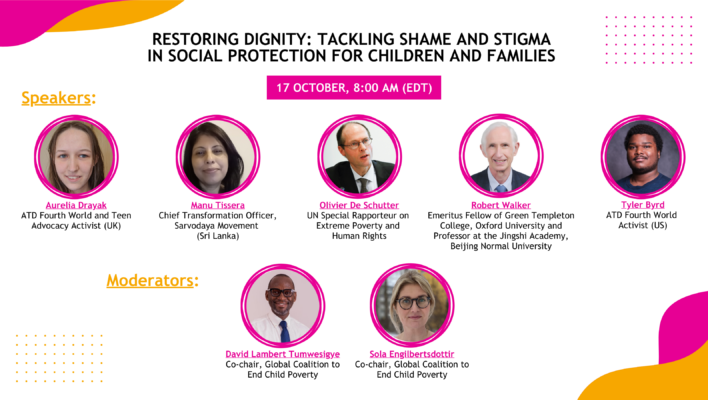‘Restoring Dignity’: A Global Coalition to End Child Poverty Webinar

On 17 October 2024, to mark the UN International Day to End Poverty, the Global Coalition to End Child Poverty organised a webinar titled “Restoring Dignity: Tackling Shame and Stigma in Social Protection for Children and Families”. The aim of the webinar was to provide insights and strategies on how to design social protection programmes that uphold dignity, reduce stigma, and create environments where all children and families can thrive.
ATD Fourth World is a member of this coalition, co-chaired by UNICEF, and Save the Children International. You can find the recordings here and the slides here. Below is the text prepared for the webinar by Aurelia Drayak, speaking from Scotland on behalf of ATD Fourth World.
My name is Aurelia Drayak, I’m 18 years old, I have lived experience of poverty and I’m care impacted. I’m also a carer, I help look after my siblings with complex health and disabilities.
I’m a co-founder of Teen Advocacy, our charity that empowers teens and young people to have a voice through peer-to-peer support and to protect their rights.
I believe there are many things that can be done to reduce shame and stigma around poverty, especially for children and families.
Creating better solutions
One of the ways shame and stigma can be reduced is to Include those with lived experience of poverty in decisions, creating solutions, and the policy affecting families and those in poverty. Children and young people are rarely given a voice, but they have invaluable contributions. Giving an active role to those in poverty not only reduces shame and stigma but it also creates better solutions.
Another important approach to reduce shame and stigma is that Help must be optional to be dignified.
When those in poverty speak up about needing support, control of their lives is taken, and they are forced to accept whatever form of ‘help’ is inflicted on them.
Shame and stigma are used as weapons that punish them if they try to object. This is traumatising and teaches us to fear help. Ultimately it is discrimination, as those in poverty are not given the option of refusing help only because they do not have the resources to help themselves and they are taught they don’t deserve them. As opposed to someone who has everything they need; they are never put in that position because they’re not dependent on anyone.
Conditionality traps people
I also believe that to reduce shame and stigma you Don’t punish people for succeeding. What I mean by this is that most support for those in poverty is conditional, it’s only given if you stay in poverty and prove you need it. Even attempting to get out of poverty has all support being pulled out of under you. This systemically traps people in poverty and shames them with the message that it’s their fault because they are forced to make choices so they don’t lose support.
It’s also vital to Empower us to be experts on ourselves. When you try to access support, you are forced to jump through hoops and prove yourself in ways that strip away your dignity and cause a great deal of distress and shame. You are not believed that you need help unless you push yourself to the point of crisis.
The insistence on ‘performance’ of those in poverty is damaging and enforces the message that unless you are near death consistently your struggles are your fault.
If we are trusted to be experts on overserves it removes this barrier of shame that is unfairly placed on those in poverty, particularly women and children.
Maintain what works
And finally, Maintain what works. Too often when systems or services work, they are ignored and left to deteriorate. In the UK we have the NHS for example. It’s a fantastic service that provides free health care for everyone. It’s wonderful. But the NHS is not maintained; when you walk into one of our hospitals the walls are covered in plaques thanking people and charities for funding vital equipment, simple things like beds and chairs, and even entire wings of the hospital. The only dignified health care, health care without shame, is health care that’s equal for everyone.
The few supports in place for those in poverty such as this must be maintained. Too often those in poverty are forced to fund their own services. It is deeply distressing to have to fight for every lifeline service available to you. It puts constant stress and shame on you for using up the limited resources available.
These are changes I believe would have a huge impact on tackling shame and stigma of those in poverty.
Thank you.

